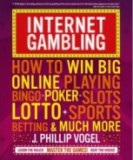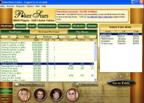
Internet Gambling
Speed Poker - Traditional Hold'em Tables Take a Lesson From Online Play
Every poker player has a style that's all their own. For some, it's preferable to ponder for no more than a few moments before making a play thereby keeping the game flowing at a steady, comfortable J. Phillip Vogel is considered a leading authority in online gambling. He has written for most of the major gaming publications worldwide including Casino Player, Strictly Slots, Gambling Online, Bluff, and many more. He is also the author of a series of best-selling gambling books collectively titled The Real Deal. He is the founder of online watchdog site TheOPN.com at www.theopn.com and currently serves as the Editorial Director for Poker Life magazine. pace. Other players, perhaps in a bid to frustrate their opponents and throw them off their game, like to delay the better part of eternity--okay—10 minutes before making a single move. Even if that move is as simple and straightforward as folding a horrible hand such as a 7-2 offsuit.
J. Phillip Vogel is considered a leading authority in online gambling. He has written for most of the major gaming publications worldwide including Casino Player, Strictly Slots, Gambling Online, Bluff, and many more. He is also the author of a series of best-selling gambling books collectively titled The Real Deal. He is the founder of online watchdog site TheOPN.com at www.theopn.com and currently serves as the Editorial Director for Poker Life magazine. pace. Other players, perhaps in a bid to frustrate their opponents and throw them off their game, like to delay the better part of eternity--okay—10 minutes before making a single move. Even if that move is as simple and straightforward as folding a horrible hand such as a 7-2 offsuit.
While card players used to the rigors of traditional play have made their peace with such stylistic actions, the new breed of player—those birthed online and unaccustomed to face-to-face play—struggle to adapt to the slower pace. Indeed, it can be frustrating playing at a real table where hands can creep along at a comparatively snail's place when used to seeing about 60 hands an hour at the virtual tables.
And that's where speed poker comes in.
Arguably one of the most entertaining versions of poker to evolve in decades, speed poker is a Texas Hold'em variant that takes the fast-paced, some would even say suicidal, action found online and drops it squarely into a traditional poker tournament setting.
Gone are the long pauses and frustrating delays, replaced with a non-stop adrenaline rush and the accompanying pressure of making potential tournament making—or breaking—decisions in as little as 15 seconds.
Players who fail to act within their allotted time have their hands either automatically checked (if there was no prior action) or declared dead when faced with an opponent's bet. It's a draconian environment that requires players to always be at the ready for each and every hand.
Along with its drastically reduced timeframe, Speed Poker has several structural deviations from the typical Texas Hold 'em fare. For example, to keep the action flowing smoothly only six players are seated per table while two dealers work in tandem to manage the game. Also, each speed poker hand starts out as pot limit, and then shifts to no limit wagering following the flop. The theory behind this rule is that such a structure allows players to see more flops and make plays that they might not otherwise be able to make in a strictly no limit setting.
Although speed poker is gaining ground and being offered more frequently during major tournament events, the best place to test your speed poker proficiency is still the Aussie Millions, a major poker tournament series held annually in Melbourne, Australia.
The Aussie Millions' Speed Poker tournament is one of the hottest tickets of the event, with players from all over the world competing for a $100,000 first prize.
This event is played as per a normal multi-table tournament until the field drops to 36 players, and is designed so that the average chip count for players will not fall to less than around 30 times the big blind. Hence players are never “short stacked” reducing pressure from the costly blinds. The theory behind this rule is that players will play their way out of the tournament rather than be blinded out.
Once 36 players remain, the tournament moves into its semi-final round. These semi-finals are a shootout where the top six chip leaders get assigned to six different tables, followed by the next six highest chip stacks, and so on until all remaining 36 players have been assigned a seat. The winners of each of the six shootouts advance to the finals to compete for the grand prize.
While some poker traditionalists chafe against the very idea of speed poker--citing a heavier reliance on luck and a diminished psychological element—many find the fast pace and unremitting ticking clock to be an even greater challenge.
After all, speed poker condenses the pressure of the game down to its very core, requiring players to examine their cards, read their opponents, make a decision and take action all in the fraction of the time of standard play. And while more hands played bolsters reliance on luck to some extent, a new set of equally laudable skills are required—especially the ability to think quickly.

